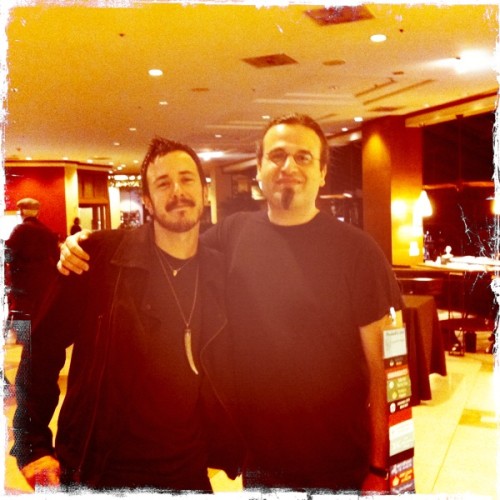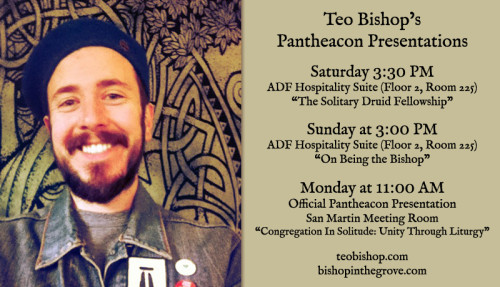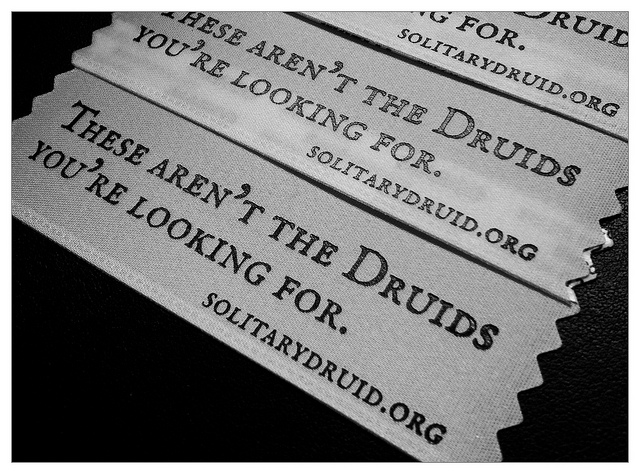
PantheaCon is a conference for Pagans, Heathens, Indigenous Non-European and many of diverse beliefs that occurs annually over President’s Day weekend in San Jose, California. Well over 2000 people attend more than 200 presentations that range from rituals to workshops and from classes to concerts.
This post is one of a series on the meaning and relevance of PantheaCon to The Wild Hunt’s authors.
_________________________________________________
“I’m buzzing. Vibrating. I know that sounds New Age-y, but that’s really what it feels like to be in my body at this moment.
I’m sitting in the lobby of the San Jose DoubleTree Hotel, and PantheaCon is exploding all around me. There are men in skirts, women in top hats, people whose gender is a complete mystery, elders, newbies (like me), and a general spirit of something happening.
This is the place to be, and I’m here.
*grin*
Oh, and did I mention that there is a strong corseted faction? Because there is, and it’s amazing.
I’m overwhelmed, really. I didn’t know it would feel quite so exhilarating to be near this many strange, and delightfully decorated people. It’s as though my books have been made flesh.
For real.”

Teo and Jason | Photo by Alex Mar
This was what PantheaCon was for me in 2012. Today marks the beginning of the 2013 PantheaCon extravaganza, the start of my Year 2, and I’m approaching this conference with a very different perspective.
I’m excited, don’t get me wrong. My excitement is just a little more tempered than it was before. After a full year of blogging, writing posts about the questionable act of public circle casting, the need for a liturgical practice for solitary Druids, and the truth about pop stars (or semi-pop stars), I feel like I have a different understanding about who the Pagan community is, and who I am in relationship to it. To write is to be known, and I certainly feel known in a way that I didn’t during my first go around.
I took advantage of that anonymity last year, but I also came away from PantheaCon with a completely new context for my identity. “Teo Bishop” is a name I chose for myself, a name I used to gingerly navigate the unknown territory of Paganism. I wrestled for a good while about what it meant to use this different name, and what reason I might have to bring my two names (and their corresponding parts) into greater alignment with one another. This dialogue continued after PantheaCon 2012, but it was forever changed by the weekend.
I went home from PantheaCon and decided that the person I am — the person who writes these posts, who considers the needs of solitaries, who asks uncomfortable questions, and who has compassion for this community in all of its diversity and complexity — is a person I love to be. It is the person who I have, in some ways, always been. And so, on account of the new awareness prompted by this transformative experience of community, I decided that this name I’d chosen would be the name I took for keeps.
There were other unexpected awarenesses, too. I wrote,
“PantheaCon … affirmed for me a number of things, not the least of which is that I have no qualms about identifying as a Pagan anymore. The discussion about that word, while fascinating for a time, is much less important to me than it was just a few months ago. Not only am I comfortable using the term “Pagan” to broadly identify what I do, I make the distinction that what I do is not all of who I am.”

Click picture to see larger image.
Since last year we have witnessed a flurry of posts about the p-word. Each time the discussion resurfaces, tempers flare and new voices emerge to stand in support of or in objection to the Pagan umbrella. Jonathan Korman compiled a list of the most recent articles on the subject, and I’m sure there have been (and will be) more.
Identity politics drives traffic to blogs and makes for a dynamic, sometimes heated conference. It took the fleshiness of PantheaCon, the tactile goodness of being crammed into rooms with other thoughtful, inquisitive people for me to free up space for these new understandings about identity. But it was the fleshiness of Others, and the discordance between that soft fleshiness and the hard rigidity of doctrine and theology that inspired such controversy last year.
I wrote an account of the silent protest, and I watched during the following months as people hashed through their feelings about gender and identity. When my genderqueer kid underwent top-surgery last summer I thought back to the trans activists and allies at PantheaCon 2012. Their witness to the need for greater acceptance and understanding stayed with me during that challenging time. They were a reminder that the flesh is real, and that the flesh is sacred, and that there is no one correct way to be embodied.
One of the challenges I face as a blogger, and that I think we all face when we choose to engage with one another in threaded comments and on forums, is that my embodiment — my own fleshiness — is easily ignored or overlooked. When we write online, we are no longer a complex mush of human parts and emotions, deserving of patience and understanding: we are just text. And as text, you and I can be taken apart, dissected with a quickness. Our fullness is reduced in proportion to our ability to articulate clearly our ideas, and if we fall short of eloquence — watch out. Somebody’s got a red pen, and they are willing to make marks all over your homework.
It’s good to provide ourselves with reminders that we are more than the words we write. We are more than our ideas, and I think we are deserving of more kindness and compassion than we sometimes give to one another. PantheaCon reminded me of that.

Flag me down in the hallways of the DoubleTree, and you could have one of these!
So I move forward into this conference with a remembrance of the sacred, messy, beautiful nature of the flesh. I will watch for the ways that our ideas become manifest, and I anticipate neither harmony nor discord. There is simply no way to know what will come of this conference, or what will be born from its discussions.
One can hope that the conference will foster, along with the debates and discussions, a new awareness in the hearts of its attendants (and those following blogs like this). Perhaps we might all walk away from the weekend with a new love of the flesh, and a new respect for the fleshiness of Others.
The Wild Hunt is not responsible for links to external content.
To join a conversation on this post:
Visit our The Wild Hunt subreddit! Point your favorite browser to https://www.reddit.com/r/The_Wild_Hunt_News/, then click “JOIN”. Make sure to click the bell, too, to be notified of new articles posted to our subreddit.
Teo has skillfully turned a general Pagan inclination – the desire for embodied insight, gnosis derived from bodily experience rather than abstract knowledge – into an ethical insight. With face-to-face contact, it becomes more difficult to reduce a person to a label, or to the sum of their articulated (or inarticulate) stance on ‘issues.’ You have a direct sensory experience of their humanity, their complexity, and their vulnerability.
Your words fill me with what I can only describe as a warm glow of recognition… I’ve been Pagan since 1986 (or all my life, depending on how one keeps score), and I still remember the profound experience of finding myself at home among a people–a people who were my people–for the first time, when I attended my very first large gathering in 1989. Your flashback took me into my own flashback! It’s magnificent to have that first experience.
But I also feel a warm glow of recognition around the way that coming back is different–especially when you are both coming back as someone who is now known and not a newcomer… AND coming back with the context now, of all the struggles and threshing that are part of building our movement together. Like watching sausages get made, it isn’t always pretty.
But there’s a level of maturity that comes when we see the wrestling, acknowledge and accept it as part of what we are, and then once again take on the magickal transition of becoming embodied in relationship to one another again. No, it isn’t the rosy haze of seeing things for the first time; now it’s obvious we’re not a Utopian dream.
But in spite of that, there is magick in coming together, being together and experiencing one another and the spiritual world directly and immediately in one another’s company.
And this is why I will always call myself Pagan, whatever other people may feel about that word: I know this magick in my bones, and I have to be true to that lived knowledge. And this is why I would urge even the most solitary among us to attend at least a few gatherings along the way.
Quakers say that their practices and traditions are “caught, not taught,” and there’s an element in our Pagan way that is the same. Of course solitary and small group work has worth!
But to be immersed in the culture we are forging together… that allows a good, potent dose of what we are all about to be transmitted. It’s a good thing. (And a good piece. Thanks for writing this.)
Just for the record , Teo those guys aren’t wearing skirts …………those are kilts , the native garb and national dress of Scotland . A kilt wearing Scot takes a dim view of comments about how lovly his skirt is , and the plaid patterns are known as tartans and are related to families or family ties. Men that wear kilts can be sensitive about such things , the only reason i even mentioned all this . I too wear a kilt on ocassion . But good luck and enjoy Pcon . Kilm
You sure about that?
Plenty of Goth types wear skirts. I know I have a couple ‘man skirts’ – black ankle length affairs in the same kind of drill cotton used to make combat trousers.
i just wanted to make sure Teo didn’t upset anyone . Not sure what the Germanic types call there Kilt type and long styles but i bet good money the name for such garb is not a skirt . But then again maybe it is . But as far as kilts go i wear a black one and my Tartan one as well, rather comfortable , less encombered if you get my drift. i must admit not so good in the winter tho . At one scot games turned a bit cool , the announce said ” I don’t know where that wind is a coming from but i can tell ya where is a going” .
You wear the right tartan, I hope?
There are plenty of men at Pagan festivals who wear actual skirts. I’m pretty sure he’d be able to tell the difference.
Evolving, unfolding might well describe your path of the last year. I am glad that you have now come together, no longer divided. Enjoy being totally all together. I have enjoyed many of your posts.